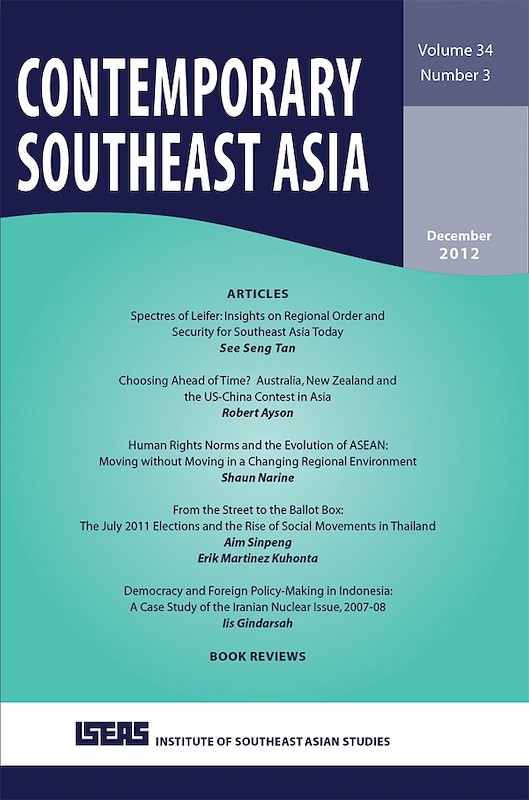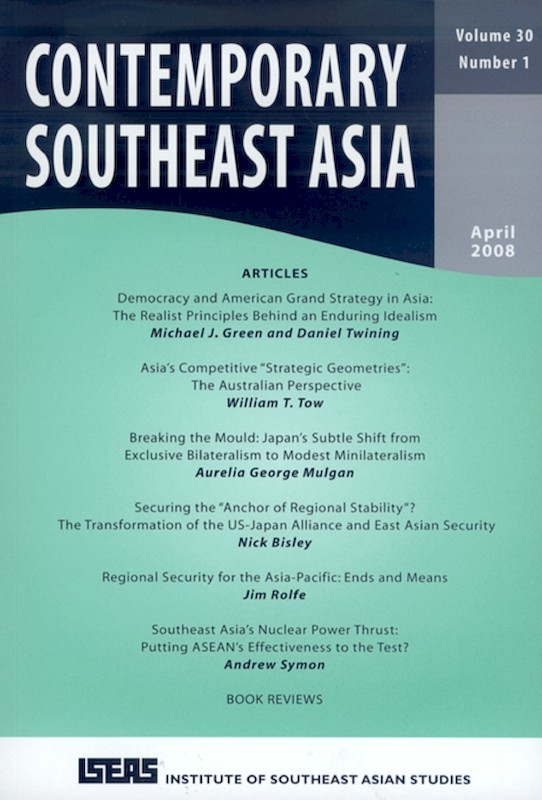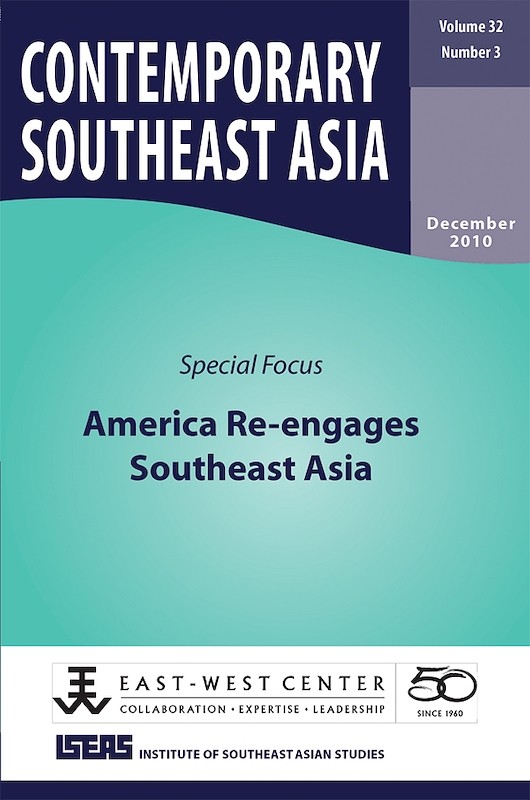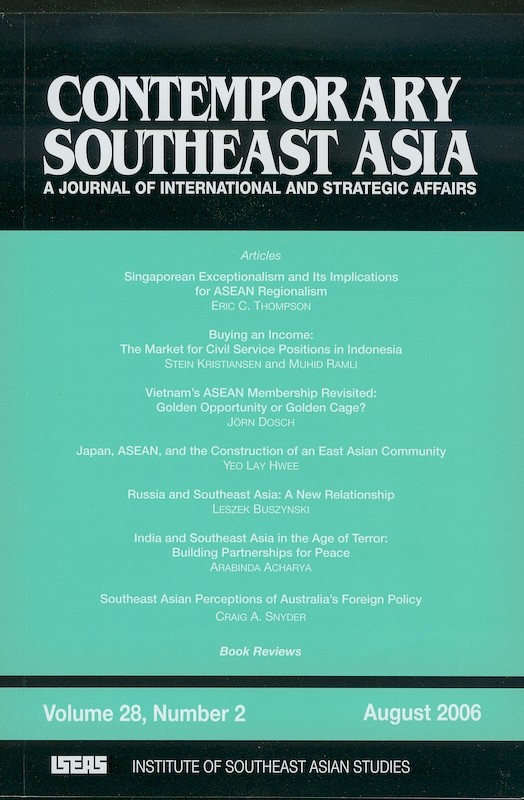Contemporary Southeast Asia Vol. 31/3 (Dec 2009)
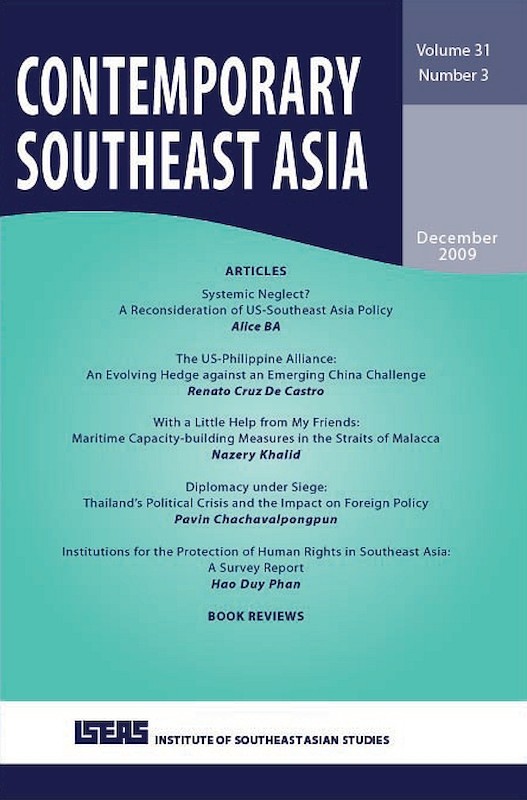
Date of publication:
December 2009
Publisher:
Institute of Southeast Asian Studies
Number of pages:
151
Code:
CS31/3
Contents
-
Contemporary Southeast Asia Vol. 31/3 (Dec 2009)
[Whole Publication] -
Preliminary pages
- ARTICLES
-
Systemic Neglect? A Reconsideration of US-Southeast Asia Policy, by Alice Ba, author see abstractThis article examines contemporary US-Southeast Asia relations as the product of both longstanding forces and a transitioning regional system. First, it highlights systemic forces behind some of the more enduring features and challenges of US-Southeast Asia policy and relations during the presidency of George W. Bush. Systemic forces highlighted include not just the structural-power dynamics that preoccupy International Relations students, but also the interplay of domestic politics, geography and history. It discloses that the key differences between Bush and his predecessors were more of degree and diplomacy than of substance. Bilateralism, sentimental idealism, and a general reactivity characterized Bush policy, much as it did his predecessors, but Bush diplomacy and policy extremes may account for the more negative regional reception to his policies. Second, in describing a regional system in transition, it highlights adaptations and adjustments on both sides that are creating a regional system that is less US-centric practically and conceptually. It argues that these changes may ultimately prove healthy for both a global power with limited attention and more constrained resources as well as its Southeast Asian partners concerned about autonomy and over-dependence. Nevertheless, these changes call for a recalibration of US-Southeast Asia policy and approach in recognition of the region's changing politics.
-
The US-Philippine Alliance: An Evolving Hedge against an Emerging China Challenge, by Renato Cruz De Castro, author see abstractThis article examines recent trends that have incrementally transformed the US-Philippine alliance as a hedge against an ascending China. It traces the revival of the alliance in the face of China's military modernization and expansionism in the South China Sea in the mid-1990s. It then discusses the revitalization of the US-Philippine alliance post-9/11 in the fight against global terrorism before moving on to discuss China's attempts to drive a wedge between the two allies through its soft-power diplomacy. The US has deepened its security relations with the Philippines through the provision of military and economic assistance to the Armed Forces of the Philippines (AFP), regular consultations and defence policy reviews between the two countries' defence departments, the conduct of combined military exercises and the implementation of new defence initiatives such as the Security Engagement Board (SEB) and Cooperative Security Locations (CSLs). In conclusion, the article argues that the deepening of the alliance has two implications: first, it ensures that the US will remain the Philippines' sole strategic ally for the foreseeable future; and second, that the alliance has been transformed into a hedge against the challenge of growing Chinese power in East Asia.
-
With a Little Help from My Friends: Maritime Capacity-building Measures in the Straits of Malacca, by Nazery Khalid, author see abstractThe Straits of Malacca, one of the busiest and most important strategic waterways in the world, faces a plethora of threats arising from its heavy use, including the increasing risk of accidents at sea and environmental degradation. As such, it is imperative that steps are taken to assist the littoral states, some of which are developing nations with limited resources, to enhance their capacity to ensure navigational safety and environ-mental protection in the Straits. To this end, a slew of maritime capacity-building measures have been introduced to improve the management of the Straits. This article discusses these efforts and argues that growing cooperation in the Straits among the littoral states and between them and the international community augurs well for the proliferation of more capacity-building measures. The article cautions, however, that any such efforts made in the name of international cooperation should not compromise the sovereign rights and sovereignty of the littoral states and should be done in accordance with international law and principles.
-
Diplomacy under Siege: Thailand's Political Crisis and the Impact on Foreign Policy, by Pavin Chachavalpongpun, author see abstractThe current crisis in Thailand has not only had an enormous impact on domestic politics but also on the conduct of the country's foreign affairs. This article argues that foreign policy is inextricably linked to domestic politics and is therefore a casualty of the ongoing battle between the two main opposing political factions - one that supports former Prime Minister Thaksin Shinawatra and the other that seeks to extirpate his legacy and influence. The article investigates the close connection between domestic politics and foreign affairs through three essential aspects: the political turmoil and its spillover effects on foreign policy; the competition between new and old regimes to legitimize their foreign policies; and the battle between state and non-state actors. At these levels, political actors have schemed to undermine their opponents, exploiting foreign policy issues as political weapons regardless of the effects their actions might have on Thailand's neighbours. The contentious case of the Thai-Cambodian dispute over the Preah Vihear Temple exemplifies how foreign policy has been held hostage to the relentless power struggle between the two leading political contenders.
-
Institutions for the Protection of Human Rights in Southeast Asia: A Survey Report, by Hao Duy Phan, author see abstractThis research note presents the findings of an expert-based survey on regional human rights cooperation in Southeast Asia. The survey was conducted to explore the views of different actors in the region regarding the establishment of the ASEAN Inter-Governmental Commission on Human Rights (AICHR). The survey also examines the case for a selective approach to establishing a regional human rights court for a selected number of Southeast Asian countries. The survey's findings have important implications and enable a deeper understanding of the process by which regional human rights cooperation is being institutionalized in Southeast Asia. As the survey results suggest, although the establishment of the AICHR represents a step forward, it may not substantially contribute to the development of a strong and effective mechanism to protect human rights in Southeast Asia. Respondents conclude that while the proposal for a human rights court for a selected number of regional countries is a good idea, significant challenges lie ahead and there is still a long way to go before the idea of a strong regional human rights system can be realized.
- BOOK REVIEWS
-
BOOK REVIEW: Political Islam in Southeast Asia. By Gordon P. Means, by Joseph Chinyong Liow, author
-
BOOK REVIEW: Malaysian Foreign Policy in the Mahathir Era 1981-2003: Dilemmas of Development. By Karminder Singh Dhillon, by Johan Saravanamuttu, author
-
BOOK REVIEW: Whose Ideas Matter? Agency and Power in Asian Regionalism. By Amitav Acharya, by Ellen L Frost, author
-
BOOK REVIEW: Islam and Nation: Separatist Rebellion in Aceh, Indonesia. By Edward Aspinall, by Bernhard Platzdasch, author
-
BOOK REVIEW: Living Silence in Burma: Surviving under Military Rule. By Christina Fink, by Moe Thuzar, author

